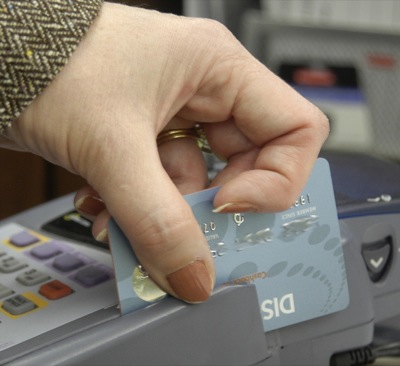Monday, November 3rd, 2008
Credit card debt - is it our next crisis?
By Shelley Grieshop

Photo by Shelley Grieshop/The Daily Standard
Credit card debt has reached record proportions in the U.S. due to many factors including high gas prices and the current economic crisis. More than half of Americans have at least two credit cards with an average debt of more than $2,000.
Editor's note: Due to privacy concerns, a fictitious name was used for the Mercer County man who agreed to share his story.
Jim and his wife were married six years before they applied for their first credit card.
As a young couple, they were told it was the best way to establish credit in order to buy a house.
"But it wasn't easy to get a card back then," says the 44-year-old Mercer County man.
They finally got accepted and decided to christen the slick plastic card with the purchase of a washing machine, he recalls. They owed very little at the time and the enticement of paying just $20 per month on their card instead of wasting quarters at the local laundry made the decision easy, he adds.
"But when you do that, you find other things you want and it adds up," Jim admits.
Fast-forward 20 years and he and his wife are in a place they never thought they'd be. They have nearly $26,000 in debt on two credit cards and are struggling to meet a minimum monthly payment of more than $500.
"I understand the mistake I made. You have to spend less than you make, it sounds simple," he says. "I just didn't stick to that all the time."
Jim's not alone. Americans are drowning in a sea of credit card debt, spending $2.2 trillion in purchases and cash advances this year alone. More than half the people in the U.S. have at least two credit cards with an average debt of more than $2,000, according to stats from the U.S. Federal Reserve.
For many people, gasoline prices are the culprit. In order to maintain their current lifestyle and still get back and forth to work, a quick slide of the credit card fills their gas tanks.
Financial experts call the out-of-control spending a recipe for disaster.
"There's a lot of households that are over-extended right now," says Joseph Eisenhauer, chairman of the department of economics at Wright State University in Dayton.
Eisenhauer believes the credit card debt problem is compounding the home mortgage crisis. The result isn't pretty and could be with us a long time, he adds.
"It's taxing. Most people, if they're dealing with both problems, will pay on their home first, not their credit card," he says.
Credit card companies often try to work with their customers by renegotiating terms, Eisenhauer says. It's better for the lenders than getting nothing back at all, he explains.
However, when debtors make no effort to pay what they owe or simply can't, companies are left with few choices. Some file civil lawsuits as a last resort, which often leads to a garnishing of the debtor's wages or the filing of bankruptcy, he says.
Experts advise those in trouble to immediately contact their credit card company and explain the problem. Meanwhile, don't stop making at least the minimum payment, they say. Missed payments nearly always prompt companies to increase interest rates, which compounds the problem.
High interest rates can make balances skyrocket. A $2,000 balance on a card with a 14 percent interest rate will take more than 14 years to pay off.
A temporary fix for high interest cards is to transfer balances to cards offering a low introductory interest rate without transfer fees. However, with the number of banks in financial trouble, offers aren't as common as they once were.
Jim, who paid off his home years ago, currently pays 13 percent interest on one card and 5.8 percent on a second card where the majority of his debt exists. His transfer offers have "dried up," he says, and he is seeking a mortgage loan to pay down his credit card debt. However, an existing first lien on his house has gotten him rejected by at least one area bank, he says.
Ironically, Jim and his wife have always paid their credit card payments on time and have a good credit rating.
"Our credit limits are high," he adds.
Recent health problems have plagued the couple, and currently neither can work. Their diminished income is now less than $1,300 per month. One of their two children still lives at home.
In an effort to get his family's life back under control, Jim has begun to document every penny they spend and has sought help from a financial counselor. He knows past spending habits were his doom, even though he thought he was doing the right thing for his family.
"I wanted to give my kids nice things, nice clothes to wear to school," Jim says.
He hopes his luck turns around soon.
"This is such a big burden to bear. I'm so sick of credit cards," he says. "I regret letting this happen but once you get in so deep, it just keeps getting deeper and deeper."
Credit card advice:
Tips for keeping credit card debt under control:
• Know the difference between needs and wants. Before making a purchase, ask yourself, "Do I really need this?"
• Always try to make more than the minimum payment due on your credit card bill. The low minimum payments set by credit card companies/lenders are designed for convenience only.
• Never let your credit card reach its spending limit. Always keep part of your credit available for emergencies and other unplanned expenses. Also, maxing out cards can be perceived by lenders as a negative on credit reports.
• Know exactly what your purchase will cost you in the end. If you charge a purchase to your card and don't pay it off right away, you'll end up spending much more than the original price after interest is added in. (There goes that "great" sale you thought you got.)
• If you get behind on payments or accumulate more debt than you can handle, immediately contact your credit card company. Often times they will work out a plan to help reduce your monthly payments before creditors come knocking.
• Advice for overall borrowing: follow the 20/10 rule. Never borrow more than 20 percent of your annual net income and never let your monthly debt payments be more than 10 percent of your monthly net income. This does not include a mortgage payment.
Source: Chase Bank
- Shelley Grieshop






